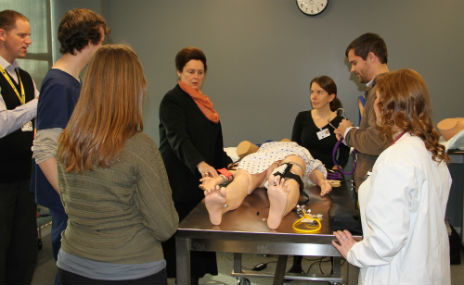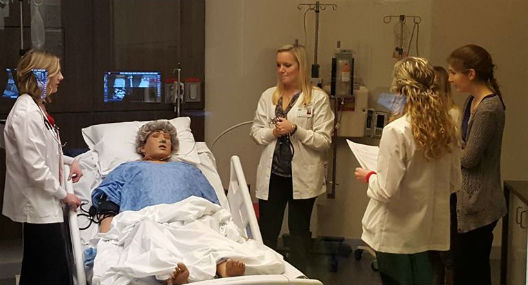IPE Program Curriculum

Interprofessional Approach to Patient Care (IPE) is a semester long module that has been designed to provide a variety of interprofessional learning activities and educational experiences. Students are assigned to interprofessional teams and have the opportunity to collaborate with students from other health care professions.
Interactive interprofessional sessions including clinical skills training, small group (team) work, interprofessional simulations in the Interprofessional Immersive Simulation Center, standardized patient interviews, and interprofessional case- based scenarios and discussions.
Topics Covered
- Team formation
- Roles and Responsibilities
- Interviewing and Interprofessional Communication
- Interprofessional Care Planning
- Social Determinants of Health
- Patient Safety

Fall Semester Sessions
Teams and Teamwork:
Apply relationship-building values and the principles of team dynamics to perform effectively in different team roles to plan, deliver,and evaluate patient/population-centered care and population health programs and policies that are safe, timely, efficient, effective, and equitable.
Roles and Responsibilities:
In order to work together we first must have an understanding of what each profession does. During the Roles & Responsibilities session student present to their IP team on their profession and their role in patient care. Patient scenarios are used for student to apply their knowledge of the different professions.
Patient Safety:
One of the highest rated sessions in the program, this hands-on session focus on patient safety hazards in which students rotate through different environments (ED, ambulatory pediatric, hospital/critical care, and home) in small IP teams to identify potential patient safety hazards. In addition, during this session, student rotate through a naloxone training, and larger group presentation covering patient safety statistics, including UT Medical Center safety data, and the Lewis Blackman video.
Naloxone Training:
Toledo is #10 in the nation for drug overdoses. This hands on session uses real-life scenarios to teach students how to administer Naloxone to reverse a drug overdose and help save lives. Students also learn how to recognize the signs and symptoms of drug withdrawal and how to properly assess the patient before naloxone administration. Our naloxone training is offered in partnership with the Lucas County Health Department.
Communication:
Building upon the patient interviewing session, this session has students interviewing a standardized patient, develop a care plan with other members of their team, and present their care plan to the patient. This session utilizes TeamStepps as teams practice transfer of care.
Spring Semester Sessions
Interprofessional Simulations:
Student work in an Interprofessional team to participate in a simulation with a high-fidelity simulator. Example cases include a patient with a breathing problem, heart problems, or injuries from an accident. In addition to managing a case, students also observe and critique a case of their peers. Scenarios are designed to promote Interprofessional communication and teamwork.


